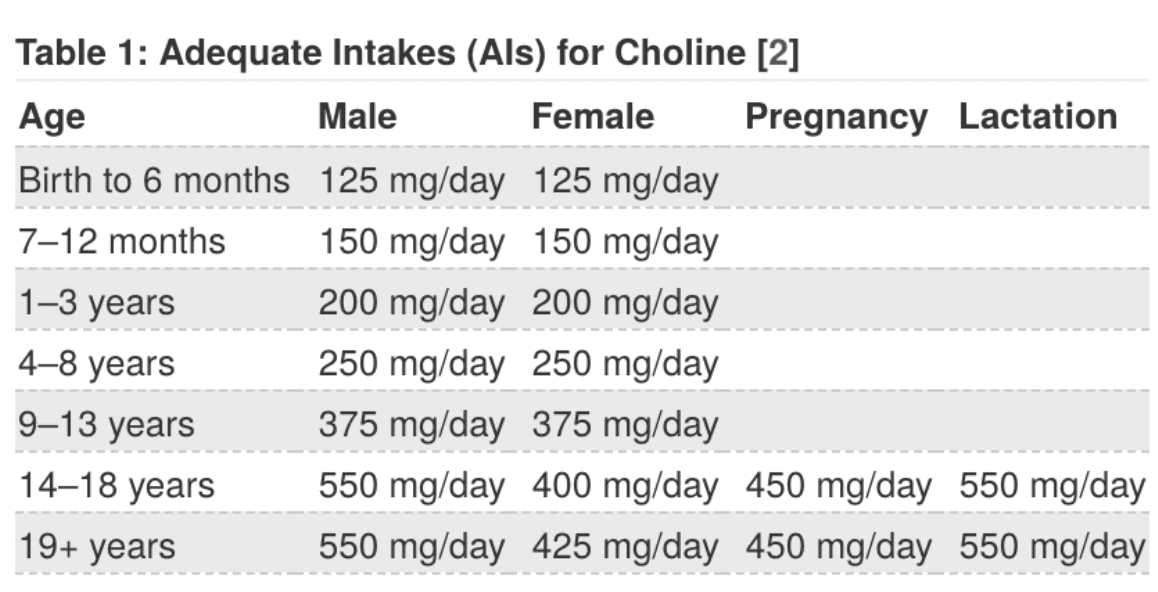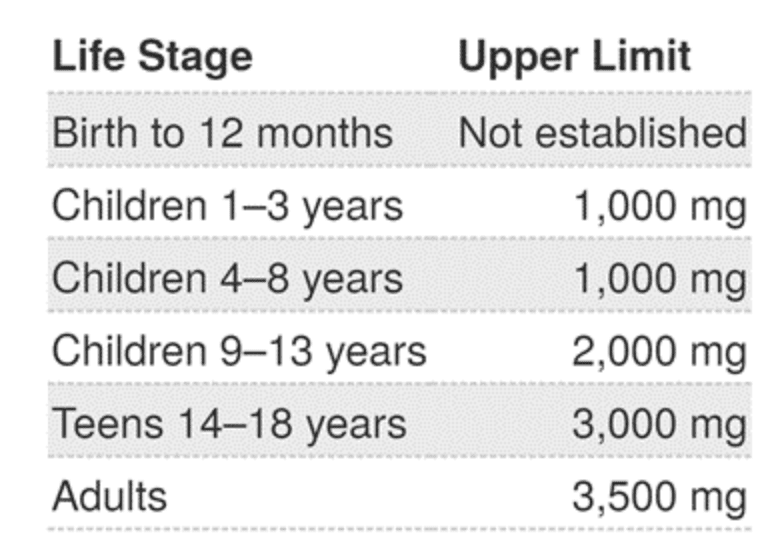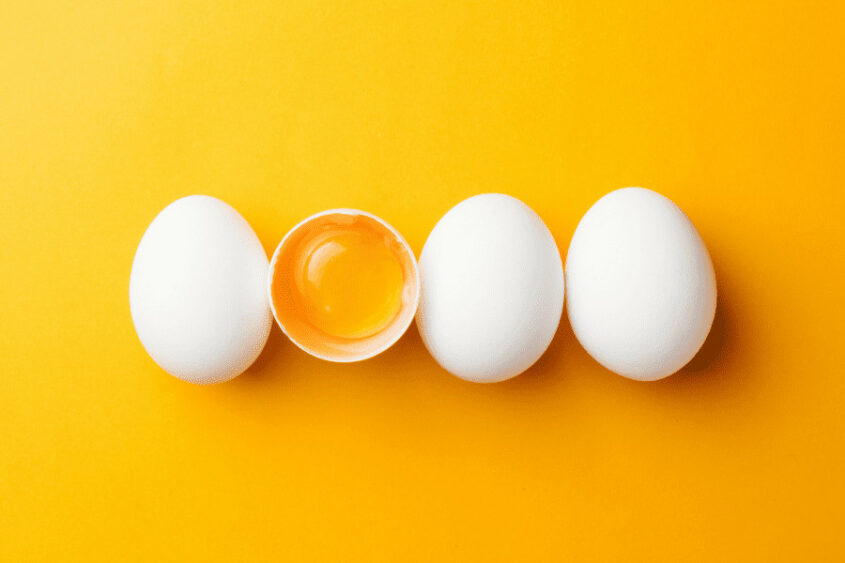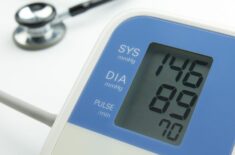Overview
Choline has been classified as an essential nutrient by the Institute of Medicine because it supports fetal brain development and cognitive function during pregnancy and beyond.
According to the National Academy of Medicine, the minimum recommended amount of choline for a pregnant woman is 450mg per day. (1)
However, approximately 90% of expecting mamas fail to meet adequate intake of this important nutrient. (2)
The human body can produce choline, but it’s not enough to meet the required daily amount.
Certain foods, prenatal vitamins, and dietary supplements can help in meeting this requirement.
The Benefits of Choline: Why It’s Important During Pregnancy And Throughout Life
Is Taking Choline Safe During Pregnancy?
From the very beginning of life in the womb and throughout your baby’s life, choline is said to be vital to good health. (3)
This wonder of a nutrient plays an important role in many ways:
- It helps in your baby’s proper brain function and spinal cord development. (4)
- It remains essential to brain development and health as your child grows. (4)
- It plays an important role in your child’s muscle control, memory, and mood. (5)
- It supports membranes that surround cells, transport of fats in the body, and liver health. (6)
- It may improve cognitive function in infants, as shown by a study done with babies of mothers exposed to higher levels of choline (930mg/day) in their third trimester. (7)
- Like folic acid or folate, it can decrease the chances of your baby having a cleft lip or palate. (8)
- It can decrease the risk of babies having neural tube defects. (9)
- It may help in making the brain more resilient to stress or trauma upon birth. (10)
- It may reduce the risk of preeclampsia in pregnant women. (11)
- It decreases risks of hypertension and type-2 diabetes in children whose moms took double doses (930mg/day). (12)
- It’s used by your body to produce fats that make up your cell protectors, the cell membranes.
- It helps other nutrients, such as omega-3 fatty acids and folate, to function well.
- Choline, together with betaine (a nutrient that protects cells, proteins, and enzymes from environmental stress), may reduce the risk of breast cancer. (13)
Choline & Mental Illness
Some studies show the possible benefits of maternal choline supplementation in decreasing the risks of the following in children:
- Attention problems
- Social withdrawal
- Schizophrenia
- Stress-related cognitive issues
When Should A Pregnant Woman Start Taking Choline?
Ideally, choline supplementation should start even before conception. But you can still catch up if you haven’t started yet.
In a 2013 placebo-controlled clinical trial led by Dr. Robert Freedman, psychiatrist, and editor-in-chief of the American Journal of Psychiatry, phosphatidylcholine, a form of choline and a phospholipid, were tested on pregnant women.
The results showed that the children whose moms maintained adequate choline levels in utero and after birth had fewer attention problems and displayed less social withdrawal at 40 months of age (14)
A genetic theory has also been formed about how supplementing with choline in the second and third trimester may play a role in preventing schizophrenia and ADD (attention deficit disorder). (15)
Another 2019 study published in the Journal of Pediatrics showed how mothers with respiratory infections like the flu, can protect their babies from future mental illness through adequate prenatal choline supplementation. (16)
The Impact of Choline Deficiency
The question now is – what can happen if you’re not getting adequate amounts of choline when pregnant?
If you’re pregnant or breastfeeding, you may be at higher risk of choline deficiency because of your body’s increased demand for the nutrient.
Choline deficiency might have the following adverse effects on you, your baby, and your baby’s life after birth:
Muscle dysfunction:
Choline, like vitamin D, might help your central nervous system increase acetylcholine levels.
Acetylcholine is an important neurotransmitter and a choline metabolite.
It serves as a messenger between your neurons and muscles. Without it, your muscles may not function normally. (17)
Neurological conditions:
Acetylcholine also benefits your hippocampus, the region of your brain that stores memory and helps process attention, learning, and alertness.
Acetylcholine deficiency has been linked to the development of Alzheimer’s disease and Parkinson’s disease. (18)
Fatty liver disease
People eating a low-choline diet tend to develop fatty liver and liver damage. (19)
Choline metabolism mostly happens in your liver, where it’s converted into phosphatidylcholine, which enhances liver function. (20)
In a study by Dr. Zeisel, a professor of nutrition and pediatrics at the University of North Carolina, NAFLD (nonalcoholic fatty liver disease) became evident among those who have adequate folate levels but are deficient in the nutrient choline. The reintroduction of choline in their diet reversed these dysfunctions. (21)
Choline, together with betaine, are important methyl donors in DNA methylation, an important process in removing toxic metals from the body.
They modulate the gene expression involved in liver function and dysfunction. (22)
The Dangers Of Low Choline During Pregnancy
Let’s take a look at the possible adverse consequences of low choline in pregnancy:
Neural Tube Defects
In the first trimester of your pregnancy, a sealed tube is formed along the embryo’s back. This tube develops into the brain and the spinal cord of your baby.
When this tube is not sealed correctly, NTD (neural tube defects) occur. This dysfunction is serious because babies with NTDs may be paralyzed, may be stillborn, or die hours after birth. (23)
A 2019 study screened 180,000 pregnant women and identified 80 whose pregnancies were affected by neural tube defects. They compared these 80 women’s blood samples to 409 randomly selected women who had babies with no structural defects.
They noted that as choline levels went up, the risk of neural tube defects went down. (9)
Miscarriage
Choline deficiency may cause the blood levels of the amino acid homocysteine to go up. This rise is a risk factor for miscarriage. (24)
Decreased memory
Choline, together with folate and vitamin b12, is needed in late pregnancy when your baby’s brain, and especially the hippocampus is developing.
In studies involving animal models, choline deficiency during pregnancy decreased the concentrations of phosphocholine and phosphatidylcholine in baby rat’s hippocampus. (25)
This decrease resulted in offspring having decreased memory performance. (26)
ADHD (Attention Deficit Hyperactivity Disorder)
Choline deficiency may also be linked to ADHD (Attention Deficit Hyperactivity Disorder). (27)
As discussed, choline is a precursor to acetylcholine which is responsible for focus and muscle control.
How Much Choline Is Safe During Pregnancy?
The American Medical Association and American Academy of Pediatrics have reaffirmed the importance of choline in pregnant and breastfeeding moms.
Pregnant women are recommended to take a minimum of 450 mg choline /day. For lactation, moms need a minimum of 550mg of choline per day.
Studies suggest that during gestation, choline is beneficial for proper placental function. (12) Your placenta is a vital organ in transporting nutrients and oxygen to your growing baby.
During lactation, you would need to increase your intake of choline to enable your milk to meet your baby’s demand to support his or her developing tissues. (12)
The table below shows the current AI (adequate intakes) for choline from birth: (28)

Choline supplements come in different forms:
- Plain choline
- Choline bitartrate
- CDP-choline (Citicoline)
- Alpha GPC
The Best Choline -Rich Foods For Pregnant Women
These foods can help you meet your required daily dietary choline intake (13):
High sources (~60mg-100g)
- Eggs
- Beef
- Chicken
- Fish
- Pork
- Cod
- Salmon
Moderate sources (~25mg-100g)
- Legumes
- Nuts
- Flaxseeds
- Milk
- Cruciferous vegetables (collard, broccoli, brussels sprouts, arugula, cauliflower)
Should You Take A Choline Supplement During Pregnancy?
The human body can’t produce enough choline on its own to meet the recommended amount needed to sustain a healthy pregnancy.
Aside from food sources, another way for you to meet your choline needs is through supplements.
Always ask your doctor first before taking supplements, especially if you’re pregnant or lactating.
You can ask your healthcare provider if you can increase your intake in the third trimester of your pregnancy.
In a 2018 study published in the FASEB Journal, higher maternal choline intake in the third trimester (exceeding the recommended daily intake dosage) appeared to improve infant cognition.
This study suggests that there may be a need for AI (adequate intake) to be increased during this period. (29)
Prenatal supplements tend to not include choline, so it can be hard to meet your choline needs with a prenatal alone. (30)
Here are top prenatal vitamins that contain choline: (31)
- Zahler Prenatal Vitamin and DHA
- New Chapter Perfect Prenatal
- Rainbow Light Prenatal Petite Mini
- Deva Vegan Prenatal Vitamin
- Rainbow Light Prenatal One
- TwinLab Prenatal Care
- The Honest Company Prenatal Multivitamin
- Nature’s Way Completia Prenatal Vitamin
- Enfamil Expecta Prenatal Multivitamin
- Vitafusion Prenatal Gummy MV
As much as 60% of the population may have the common genetic mutation known as MTHFR.
Women who have this may need a much higher amount of choline than the generally recommended levels. (32)
Women with this mutation should also aim to get much of their choline intake from food sources. A vegetarian, vegan, or egg-free diet isn’t advisable for women with this mutation.
Talk to your doctor about the optimal amount of choline to take if this is you.
How Much Choline Is In Prenatal Vitamins?
It may be best to supplement separately with choline rather than take a prenatal that contains choline.
Why?
According to author of “Real Food For Pregnancy” and registered dietitian, Lily Nichols: (33)
“Nutrients like choline… are bulky and therefore, manufacturers leave them out or put in minimal amounts to keep the total number of pills down.”
Researcher and author of “Brain Health From Birth,” Rebecca Fett suggests taking stand-alone choline supplements instead. She suggests brands like Solgar, Nature’s Way, and Nested. (34)
She advises that:
“The dose found in separate choline supplements is typically between 350 and 500 milligrams.
Taking a 350 milligram supplement, combined with a diet that includes minor sources of choline such as meat, should be sufficient to reach the minimum daily requirement.
Vegetarians and vegans may need a higher supplement dose, such as 500 milligrams.”
Potential Side Effects Of Too Much Choline
Exceeding the limit for choline intake may have the following side effect: (28)
- Fishy body odor
- Vomiting
- Heavy sweating
- Salivation
- Low blood pressure
- Liver damage
- Increased risk of heart disease
Here’s a table that lists choline amount limits from:

According to the University of Rochester Medical Center, you should avoid choline if you suffer from depression or bipolar disorder. They also warn that choline might actually cause depression in some individuals. (35).
Choline & COVID-19 In Pregnancy
If you developed COVID-19 while pregnant, you might find it comforting to know that it is not transmitted directly to your baby.
A 2020 study concluded that dietary intake of choline during pregnancy might protect fetal development even if the mother contracts a viral infection like COVID-19.
This is why choline levels are most important as early as the first trimester of pregnancy (36).
REFERENCES
(1) https://www.clinmedjournals.org/articles/jfmdp/journal-of-family-medicine-and-disease-prevention-jfmdp-2-048.php?jid=jfmdp#:~:text=The%20current%20recommended%20choline%20intake,of%20birth%20defects%20%5B2%5D
(2) https://pubmed.ncbi.nlm.nih.gov/26886842/#:~:text=Results%3A%20Suboptimal%20intakes%20of%20choline,intake%20(AI)%20for%20choline
(3) https://www.incredibleegg.org/nutrition/articles/choline-throughout-the-life-span/#:~:text=Beginning%20in%20fetal%20development%2C%20Choline,supports%20brain%20health%20throughout%20life
(4) https://www.ncbi.nlm.nih.gov/pmc/articles/PMC3046737/
(5) https://www.health.harvard.edu/blog/omega-3-fatty-acids-for-mood-disorders-2018080314414
(6) https://www.ncbi.nlm.nih.gov/pmc/articles/PMC6834330/
(7) https://www.karger.com/Article/FullText/508052
(8) https://pubmed.ncbi.nlm.nih.gov/15234930/
(9) https://news.stanford.edu/news/2009/august10/choline-081209.html
(10) https://researchblog.duke.edu/2012/03/14/a-brain-food-you-never-heard-of/
(11) https://www.ncbi.nlm.nih.gov/pmc/articles/PMC5537879/#:~:text=Choline%20has%20previously%20been%20shown,in%20healthy%20women%20%5B7%5D
(12) https://www.ncbi.nlm.nih.gov/pmc/articles/PMC6722688/
(13) https://pubmed.ncbi.nlm.nih.gov/23140534/
(14) https://ajp.psychiatryonline.org/doi/full/10.1176/appi.ajp.2012.12070940
(15) https://www.ncbi.nlm.nih.gov/pmc/articles/PMC4466850/#:~:text=Dietary%20supplementation%20in%20the%20second,deficit%20disorder%20has%20been%20observed
(16) https://www.jpeds.com/article/S0022-3476(18)31727-X/fulltext
(17) https://www.nap.edu/read/4563/chapter/25
(18) https://www.ncbi.nlm.nih.gov/pmc/articles/PMC4268065/
(19) https://www.ncbi.nlm.nih.gov/pmc/articles/PMC3601486/
(20) https://www.ncbi.nlm.nih.gov/pmc/articles/PMC4113756/
(21) https://www.ncbi.nlm.nih.gov/pmc/articles/PMC2518394/
(22) https://doi.org/10.1097/mco.0b013e3283600d46
(23) https://familydoctor.org/condition/neural-tube-defects/#:~:text=Living%20with%20neural%20tube%20defects,cause%20paralysis%20below%20the%20spine
(24) https://www.osti.gov/etdeweb/servlets/purl/21112817
(25) https://pubmed.ncbi.nlm.nih.gov/14608083/
(26) https://pubmed.ncbi.nlm.nih.gov/12946691/
(27) https://www.ncbi.nlm.nih.gov/pmc/articles/PMC3164006/
(28) https://ods.od.nih.gov/factsheets/Choline-HealthProfessional/
(29) https://faseb.onlinelibrary.wiley.com/doi/10.1096/fj.201700692RR
(30) https://www.npr.org/sections/health-shots/2016/10/22/498843225/can-mental-illness-be-prevented-in-the-womb
(31) https://www.clinmedjournals.org/articles/jfmdp/jfmdp-2-048table1.html
(32) https://pubmed.ncbi.nlm.nih.gov/20669423/
(33) Nichols, L. (2018). Real Food for Pregnancy. Lily Nichols.
(34) Fett, R. (2019). Brain Health from Birth: Nurturing Brain Development During Pregnancy and the First Year. Franklin Fox Publishing LLC.
(35) https://www.urmc.rochester.edu/encyclopedia/content.aspx?contenttypeid=19&contentid=Choline
(36) https://www.sciencedirect.com/science/article/abs/pii/S0022395620304544












